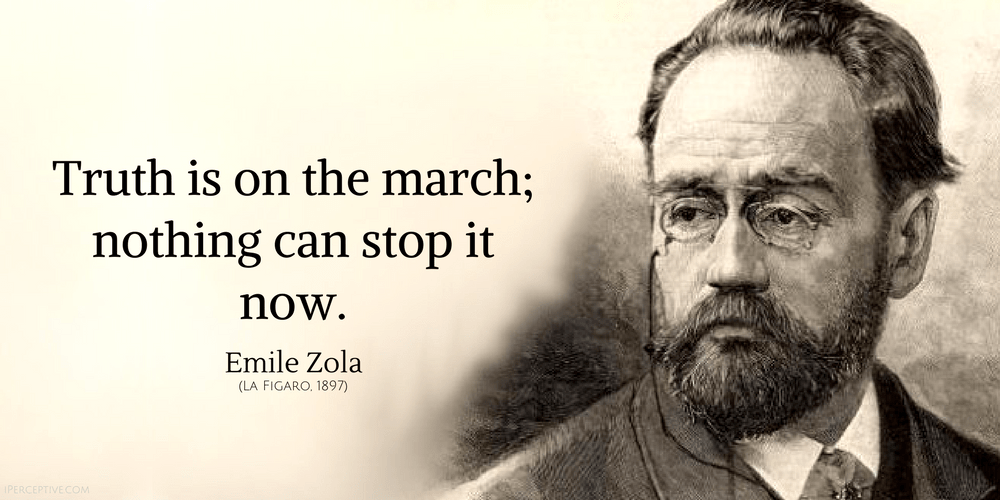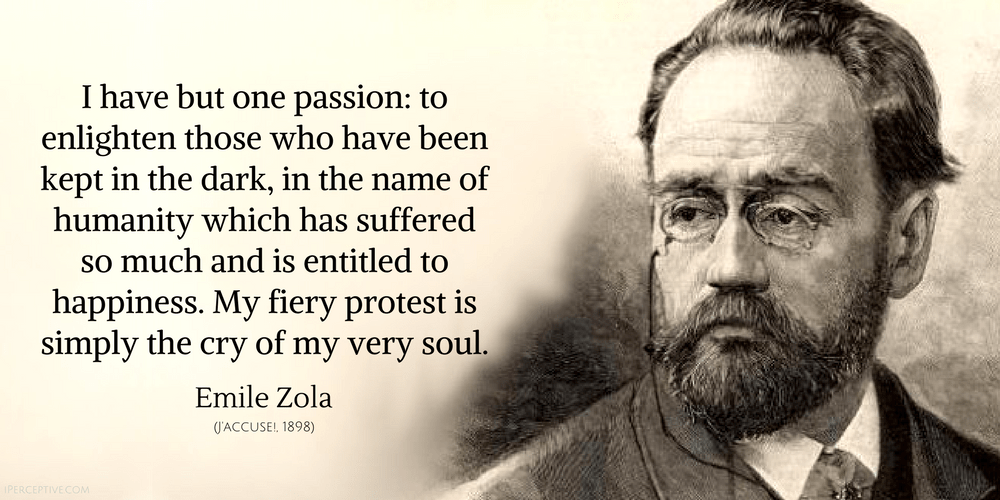Emile Zola Quotes
Everything is only a dream.
Emile Zola (Les Rougon-Macquart - The Dream, 1888)
Truth is on the march; nothing can stop it now.
Emile Zola (La Figaro, 1897)
There are two men inside the artist, the poet and the craftsman. One is born a poet. One becomes a craftsman.
Emile Zola (Letter to Paul Cézanne, 1860)
One forges one's style on the terrible anvil of daily deadlines.
Emile Zola (La Figaro, 1881)
The past was but the cemetery of our illusions: one simply stubbed one's toes on the gravestones.
Emile Zola (Les Rougon-Macquart - The Masterpiece, 1885)
In my view you cannot claim to have seen something until you have photographed it.
Emile Zola
Don't go looking at me like that because you'll wear your eyes out.
Emile Zola (Les Rougon-Macquart - La Bête humaine, 1890)
If I cannot overwhelm with my quality, I will overwhelm with my quantity.
Emile Zola
If you ask me what I came to do in this world, I, an artist, I will answer you: I am here to live out loud!
Emile Zola
The artist is nothing without the gift, but the gift is nothing without work.
Emile Zola
Smut detected in it by moral men is theirs rather than mine. Scientific truth was my touchstone for every scene, even the most febrile.
Emile Zola (Thérèse Raquin - Preface to 2nd Edition, 1868)
Blow the candle out, I don't need to see what my thoughts look like.
Emile Zola (Les Rougon-Macquart - Germinal, 1885)
The fate of animals is of greater importance to me than the fear of appearing ridiculous; it is indissolubly connected with the fate of men.
Emile Zola
I am little concerned with beauty or perfection. I don't care for the great centuries. All I care about is life, struggle, intensity. I am at ease in my generation.
Emile Zola (My Hates, 1866)
If you shut up truth and bury it under the ground, it will but grow, and gather to itself such explosive power that the day it bursts through it will blow up everything in its way.
Emile Zola
I have but one passion: to enlighten those who have been kept in the dark, in the name of humanity which has suffered so much and is entitled to happiness. My fiery protest is simply the cry of my very soul.
Emile Zola (J'accuse!, 1898)
We have before us the ignoble spectacle of men who are sunken in debts and crimes being hailed as innocent, whereas the honor of a man whose life is spotless is being vilely attacked: A society that sinks to that level has fallen into decay.
Emile Zola (J'accuse!, 1898)
The public was astounded; rumors flew of the most horrible acts, the most monstrous deceptions, lies that were an affront to our history. The public, naturally, was taken in. No punishment could be too harsh. The people clamored for the traitor to be publicly stripped of his rank and demanded to see him writhing with remorse on his rock of infamy.
Emile Zola (J'accuse!, 1898)
Ah, what a cesspool of folly and foolishness, what preposterous fantasies, what corrupt police tactics, what inquisitorial, tyrannical practices! What petty whims of a few higher-ups trampling the nation under their boots, ramming back down their throats the people's cries for truth and justice, with the travesty of state security as a pretext.
Emile Zola (J'accuse!, 1898)
As they have dared, so shall I dare. Dare to tell the truth, as I have pledged to tell it, in full, since the normal channels of justice have failed to do so. My duty is to speak out; I do not wish to be an accomplice in this travesty. My nights would otherwise be haunted by the spectre of the innocent man, far away, suffering the most horrible of tortures for a crime he did not commit.
Emile Zola (J'accuse!, 1898)
A document concerning national defense that could not be produced without sparking an immediate declaration of war tomorrow? No! No! It is a lie, all the more odious and cynical in that its perpetrators are getting off free without even admitting it. They stirred up all of France, they hid behind the understandable commotion they had set off, they sealed their lips while troubling our hearts and perverting our spirit. I know of no greater crime against the state.
Emile Zola (J'accuse!, 1898)
VIDEO
We are told of the honor of the army; we are supposed to love and respect it. Ah, yes, of course, an army that would rise to the first threat, that would defend French soil, that army is the nation itself, and for that army we have nothing but devotion and respect. But this is not about that army, whose dignity we are seeking, in our cry for justice. What is at stake is the sword, the master that will one day, perhaps, be forced upon us. Bow and scrape before that sword, that god? No!
Emile Zola (J'accuse!, 1898)
I repeat with the most vehement conviction: truth is on the march, and nothing will stop it. Today is only the beginning, for it is only today that the positions have become clear: on one side, those who are guilty, who do not want the light to shine forth, on the other, those who seek justice and who will give their lives to attain it. I said it before and I repeat it now: when truth is buried underground, it grows and it builds up so much force that the day it explodes it blasts everything with it. We shall see whether we have been setting ourselves up for the most resounding of disasters, yet to come.
Emile Zola (J'accuse!, 1898)
In making these accusations I am aware that I am making myself liable to articles 30 and 31 of the law of 29/7/1881 regarding the press, which make libel a punishable offence. I expose myself to that risk voluntarily.
Emile Zola (J'accuse!, 1898)
It is a crime that those people who wish to see a generous France take her place as leader of all the free and just nations are being accused of fomenting turmoil in the country, denounced by the very plotters who are conniving so shamelessly to foist this miscarriage of justice on the entire world. It is a crime to lie to the public, to twist public opinion to insane lengths in the service of the vilest death-dealing machinations. It is a crime to poison the minds of the meek and the humble, to stoke the passions of reactionism and intolerance, by appealing to that odious anti-Semitism that, unchecked, will destroy the freedom-loving France of the Rights of Man. It is a crime to exploit patriotism in the service of hatred, and it is, finally, a crime to ensconce the sword as the modern god, whereas all science is toiling to achieve the coming era of truth and justice.
Emile Zola (J'accuse!, 1898)
Dreyfus is innocent. I swear it! I stake my life on it — my honor! At this solemn moment, in the presence of this tribunal which is the representative of human justice, before you, gentle. men, who are the very incarnation of the country, before the whole of France, before the whole world, I swear that Dreyfus is innocent. By my forty years of work, by the authority that this toil may have given me, I swear that Dreyfus is innocent. By all I have now, by the name I have made for myself, by my works which have helped for the expansion of French literature, I swear that Dreyfus is innocent. May all that melt away, may my works perish if Dreyfus be not innocent! He is innocent. All seems against me — the two Chambers, the civil authority, the most widely-circulated journals, the public opinion which they have poisoned. And I have for me only an ideal of truth and justice. But I am quite calm; I shall conquer. I was determined that my country should not remain the victim of lies and injustice. I may be condemned here. The day will come when France will thank me for having helped to save her honor.
Emile Zola (Appeal for Albert Dreyfus at his trial, 1898)





